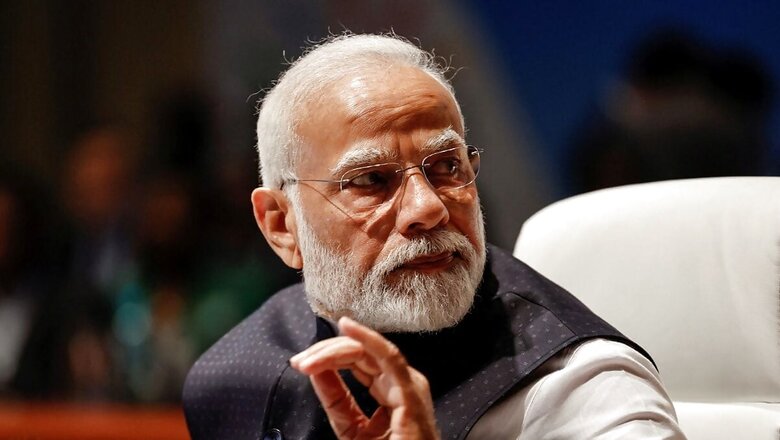
views
The US has accused India of a plot to assassinate US-based Khalistani leader and a designated terrorist in India, Gurpatwant Singh Pannun, while the Justin Trudeau government has alleged India of murdering Canada-based militant Hardeep Singh Nijjar.
While both cases, particularly Pannun’s, may create a diplomatic headache for India, but they serve the Modi government well politically just six months before the country elects its next government.
Many would argue, the North American nations have served the 2024 verdict to Narendra Modi on a platter well ahead of the election begins.
Game of Political Narratives
It was March 2019 when Prime Minister Narendra Modi was addressing a rally in Gujarat. He was talking about dealing with the menace of terrorism. What he said next holds significance today – “I can’t wait any longer. It is my nature to settle accounts one by one. Now, we will enter their house and kill them.”
Today, five years later, just ahead of 2024 General Elections, when the two western nations, part of the coveted Five eyes (an intelligence alliance of five nations), have accused India of either assassinating or attempting to kill those that India considers a national security threat, it would only complement Modi’s own promise.
While India has called Canada’s allegations “absurd” and constituted an inquiry committee after the US brought those charges, it is important to understand who are we talking about and who brought the charges in the first place.
Pannun, comes from Khankot village on the outskirts of Amritsar, Punjab, and is now a US citizen whom India designates as a terrorist. He is a well-known founder and leader of Sikhs for Justice, a pro-Khalistan organisation based in New York. Recently, he advocated for a repeat of the 1985 Air India-style bombing that killed 329 — an outright terrorist act in the Khalistan chapter.
Now, India is being accused of plotting an assassination bid on Pannun on US soil by none less than the Federal Bureau of Investigation (FBI), which has been raised at the State Secretary level — Anthony Blinken.
Meanwhile, Hardeep Singh Nijjar, born in Jalandhar, moved to Canada in 1997, where he became vocal advocate for the creation of Khalistan. He had been labelled a terrorist by India, accused of, among other activities, being the “mastermind” behind the Khalistan Tiger Force (KTF), a banned militant group in the country.
Unlike in Pannun’s case, the two identified gunmen wearing dark clothes with hoods were seen outside a Sikh temple in a Vancouver this year. Canada’s Prime Minister Justin Trudueu told the Canadian Parliament, although without evidences, that India was behind the extra-judicial killing.
Now, given the level from which the allegations come and the stature of the nations involved, including the United States, the political narrative that percolates down to the common man in India will be Modi has walked the talk. Be it a management graduate in Baroda or farmer in Bulandshahar, a venture capitalist in Mumbai or a hotelier in Manali — the message is uniform for all — ‘Modi hai to mumkin hai‘, which politically bolsters Prime Minister’s stature in their eyes.
This may give some international headache to India, but will also give Modi a giant push even before the BJP starts campaigning for the upcoming Lok Sabha election.
Also, the assassination of terrorists in Pakistan by “unidentified men” has increased in the recent times. This November, LeT commander Akram Khan Ghazi was gunned down by unidentified bike-borne men in Pakistan’s Khyber Pakhtunkhwa. Ghazi’s killing is the third assassination of a top Lashkar operative in recent days. Many consider Indian agencies are behind it.
Manmohan vs Modi Era
At a 2019 rally in Gujarat — before another Lok Sabha election — Narendra Modi portrayed a contrast between Manmohan Singh’s era and his when it comes to dealing with terrorism. “Terrorism has been firing bullets into the chest of India for 40 years, but people engrossed in vote bank politics were afraid to take action. I don’t care about the seat of power, I am worried about my country. I am concerned about the safety of the people of my country,” Modi had said in his home state.
But it’s one thing to make tall claims and another to walk the talk in public life. During the 26/11 terror attack in 2008, the 10 Lashkar-e-Taiba terrorists created mayhem for days killing at least 257, drawing words of condemnation at best from the Indian government. In fact, in 2015, the foremost ringleader of the attacks, Zakiur Rehman Lakhvi was released on bail and disappeared. Former IAF chief BS Dhanoa said the UPA government had rejected a proposal of the air force to strike Pakistani terrorist camps after 26/11.
Contrast it with 2016, two years into the new government, PM Modi ordered a surgical strike across the Line of Control over to the Pakistan-Occupied Kashmir. The daring raid was in answer to a terror attack in Uri, the same year killing 19 soldiers. India claimed it attacked terror “launch pads” and inflicted “significant casualties”.
The same year, Delhi witnessed a series of five synchronised bomb blasts that took place within a few minutes killing 20 and injuring 90 people. They were planted in busy commercial hubs like Connaught Place and Karol Bagh. A brazen terror organisation Indian Mujahideen claimed responsibility. Earlier, blasts happened in Bengaluru and Ahmedabad too. Intelligence officials had intercepted a call made “from the across the border” claiming “Operation BAD (referring to the three cities) is successful”. While arrests followed, India failed to address the root cause — Pakistan. The phrase “I condemn” started to be joked around, given the failure of the political establishment of the day.
But in 2019, the Modi government sanctioned air strike deep into Pakistan’s Balakot region in response to the Pulwama terror attack. The air strike in Pakistan’s Khyber Pakhtunkhwa region was informed to Pakistan by Indian forces and to Indian media.
Beyond the diplomatic intricacies, as Blinken, the FBI, Trudeau label charges violating US and Canada’s sovereignty by ordering “extra-judicial killing” — true or untrue –they have reinforced the narrative of “ghar me husker marenge” narrative in the minds of common Indian voters that will only help Modi politically.



















Comments
0 comment